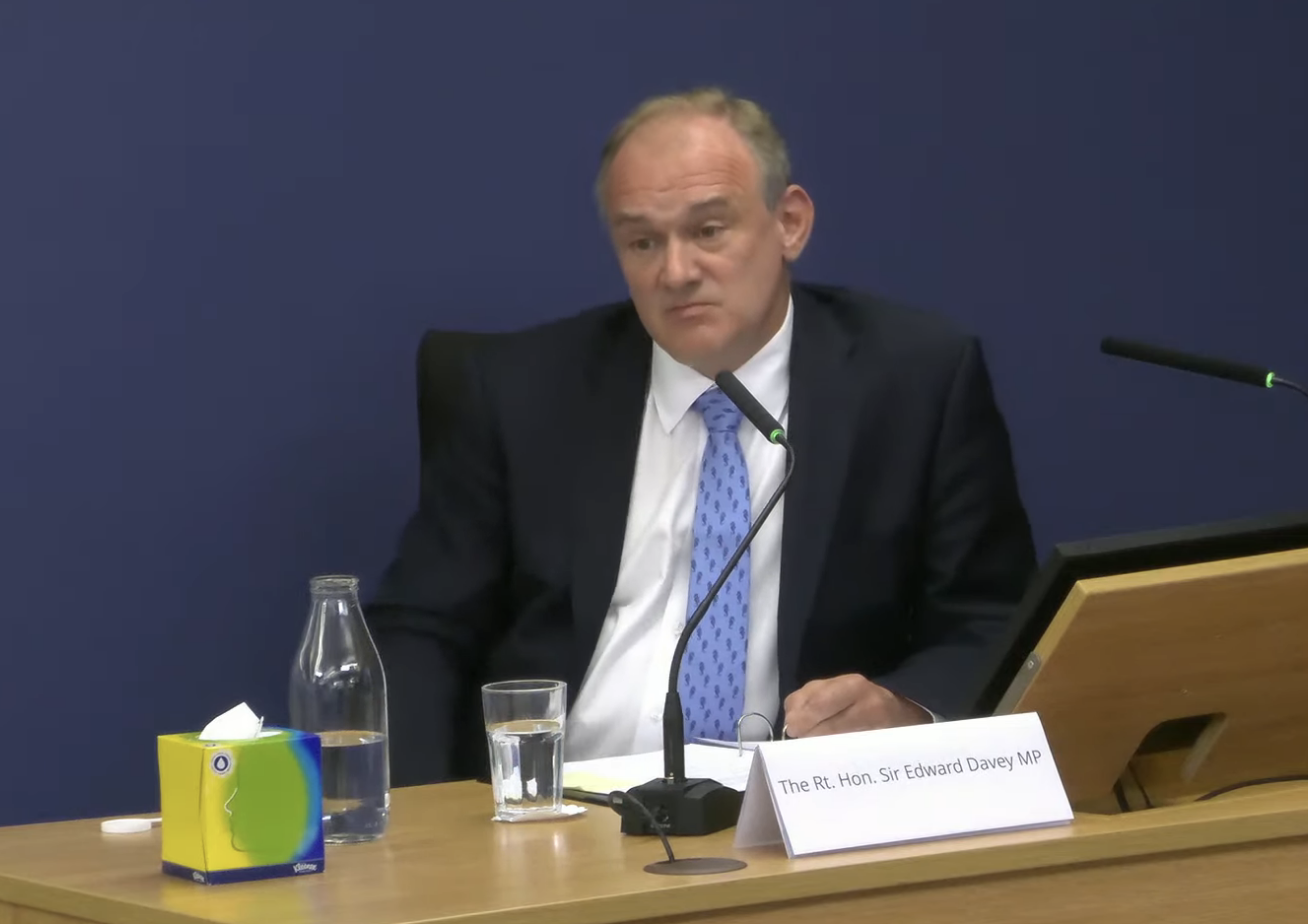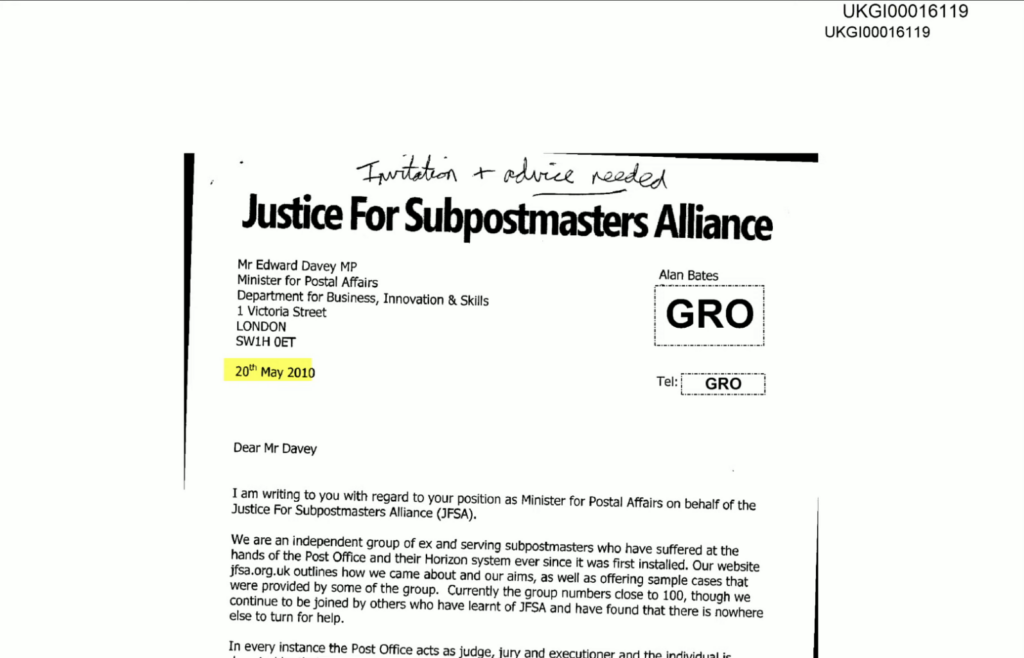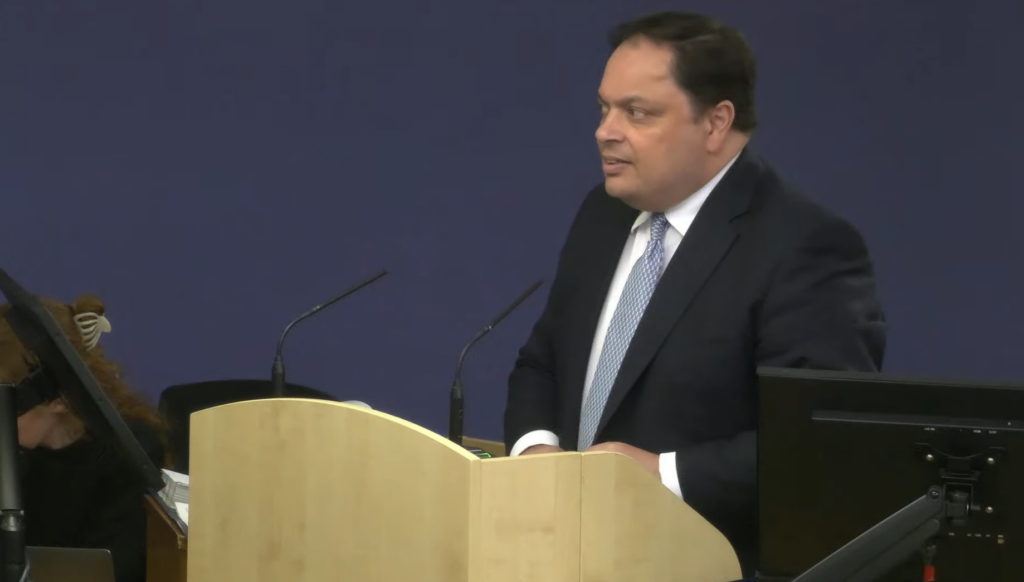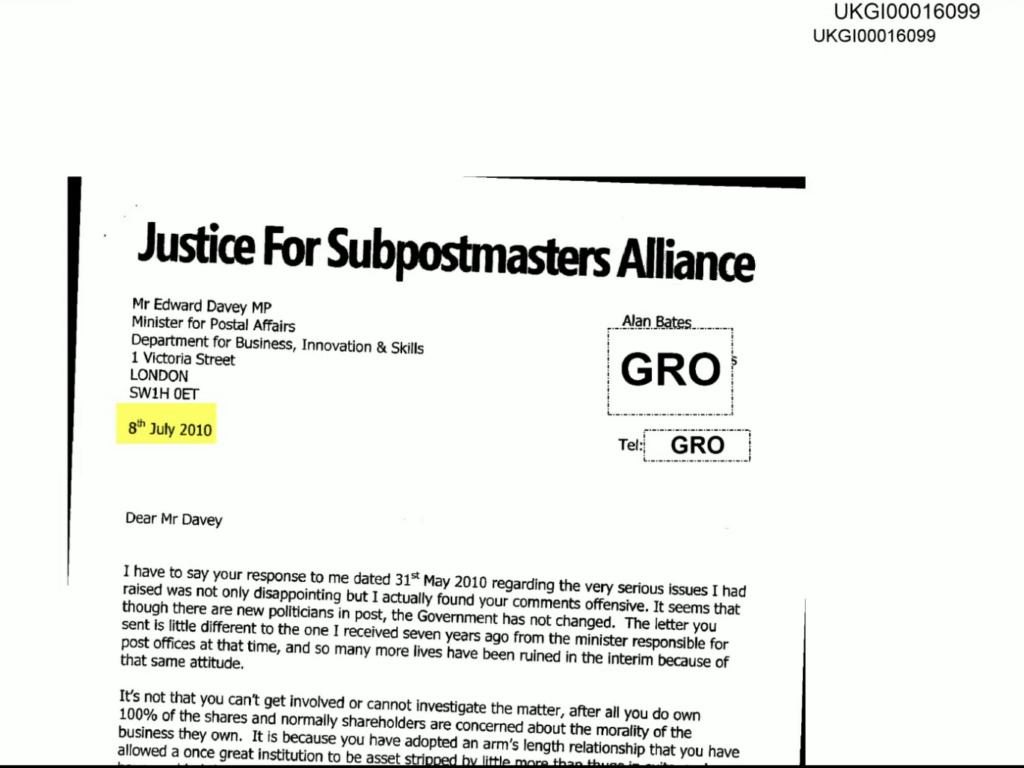
I lost patience with Ed Davey at around 2.30pm this afternoon. It was when Jason Beer read into the record the sheer number of red flags being waved in Ed Davey’s face about the Post Office’s behaviour and its dodgy Horizon IT system from the moment he took office.
On 20 May 2010, the day Davey was appointed, Alan Bates wrote a letter on Justice For Subpostmasters Alliance headed paper. It read:
“We are an independent group of ex and serving subpostmasters who have suffered at the hands of the Post Office and their Horizon system ever since it was first installed. Our website jfsa.org.uk outlines how we came about and our aims, as well as offering sample cases that can provided by some of the group. Currently the group numbers close to 100, though we continue to be joined by others who have learnt of JFSA and have found that there is nowhere else to turn for help.”
Bates told of individual Subpostmasters being “deserted by their reputedly representative organization, the National Federation of Subpostmasters”. He noted the unfairness of the Postmasters’ contractual relationship: “The Post Office blindly state that there are not, nor have there ever been any system errors, so subsequently anything wrong is entirely the responsibility of the Subpostmaster.” Bates pointed out that the contract takes no account of the new Horizon technology, and told Davey the Post Office is using it “to intimidate and prosecute Subpostmasters.”
The letter, in a succinct manner, sets out the problems (the Horizon IT system and the contract), the number of people involved, the fact that the Post Office is “intimidating and prosecuting” people (something Davey today said he was not aware of until the Inquiry) and the feeling they’ve been abandoned by their union. Bates even offers a solution:
“Our organization has access to a number of specialists who could provide the questions and analyze the resulting data if required. Though an independent external investigation instigated at Ministerial level would be the most appropriate, and would without any doubt easily find evidence of the error-ridden system.”

It’s cogent and persuasive, but it’s only one letter. Davey claims it’s possible he didn’t see it before signing the response which was prepared for him by officials within the Business Department.
Davey today agreed his reply was “terse”. He wrote (or at least, he signed a letter which said): “Since 2001, when the Royal Mail (which includes Post Office Ltd (POL)) was set up as a public limited company with the Government as its only shareholder, Government has adopted an arm’s length relationship with the company so that it has the commercial freedom to run its business operations without interference from the shareholder. The integrity of the Post Office Horizon system is an operational and contractual matter for POL and not Government, whilst I do appreciate your concerns and those of the Alliance members, I do not believe a meeting would serve any useful purpose.”
At this point let’s give Davey the benefit of the doubt. He’s just got his first ministerial job, it’s a huge brief, he’s inexperienced, insanely busy and he’s wholly reliant on his officials to tell him what’s what.
What’s what?
Part of the what’s what is set out in Davey’s letter to Bates. To repeat: “Government has adopted an arm’s length relationship with the company so that it has the commercial freedom to run its business operations without interference from the shareholder.”
Davey explained to the Inquiry that he had been told by his officials that ministers only got involved in strategy and could not, or should not get involved in operational matters – that was solely for the Post Office. This rule was apparently set out in the Postal Services Act (a point energetically made by Pat McFadden at the Inquiry this morning). Davey told Jason Beer KC, who was asking questions on behalf of the Inquiry: “That made sense to me. I was not qualified to intervene… and would not have had time to get involved in the day-to-day running of the Post Office.”

Beer wasn’t sure about this: “You understood the Postal Services Act… to require the government to operate at arms length to the Post Office and Royal Mail Group?” he said.
“Yeah, I think that was a reference that we put in a number of letters that were drafted for me to sign and that was the basis as I understood it.” replied Davey.
“Did you ever receive a briefing on what the Postal Services Act in fact said as to this issue?” asked Beer.
“No”, replied Davey.
“And did you ever look at the Postal Services Act to see what the legal relationship between government and Royal Mail Group and Post Office was?” asked Beer.
“No”, replied Davey.
It turns out, as Beer demonstrated to Davey, there was no “inflexible rule, less still an inflexible rule of law” which prevented ministers from getting involved in Post Office matters enshrined in the Postal Services Act or anywhere else. It was simply a “line” spun by civil service officials when it suited them to do so.
Nonetheless, this brush-off was used as the sole reason for Davey’s inaction throughout his tenure. And it wasn’t just Alan Bates who was raising red flags to Davey’s office. For a solid twenty minutes this afternoon, Jason Beer walked Davey through every opportunity he had to do something proactive about the scandal.
There was a note on 7 June 2010 from Keith Simpson MP, enclosing a letter from his constituent Margaret Callow, who had previously written: “on behalf of my daughter [about] her treatment along with others at the hands of the Post Office. I realise your help and support in this matter will have been delayed due to the election and that is quite understandable. However, I now approach you again as this is a problem that will not go away.”
There was a parliamentary question on 17 June from Priti Patel whose constituent Graham Ward had been ruined by the Post Office due to what he felt were clear and obvious errors in the Horizon IT system. Patel’s question asked;
“how many times Ministers in [the Business] Department had discussions with Post Office Ltd on the Horizon system in the last five years.”
Davey’s written reply stated: “The Horizon system is an operational responsibility of the company and I have had no such discussions.”
On 21 June Patel submitted another parliamentary question to Vince Cable, the Business Secretary, and Davey’s boss. Patel wanted to know if the Secretary of State would: “review the effectiveness of the Post Office’s Horizon system; and if he will report his findings to the House.”
The responsibility for replying fell to Davey, who wrote: “I have asked David Smith, the Managing Director of Post Office Ltd, to respond directly to the Hon Member and a copy of his reply will be placed in the House Libraries.”
Patel tried again on 22 June, again asking Cable: “what representations he has received from the Justice for Subpostmasters Alliance in the last 12 months; if he will meet representatives of the Alliance to discuss the Post Office’s Horizon system; and if he will make a statement.”
Cable did not make a statement. Instead the question made its way once more to Davey who again sent Patel’s query to David Smith. Jason Beer was bemused.
“The question was to ask the Government what representation it had received from JFSA in the last 12 months.” said Beer.
“Indeed,” replied Davey, ” but I was…”
Beer cut in. “Why would Mr Smith know the answer to that more than government?”
“Well, I was assuming that was the way that it had been done on the basis of what the advice officials were giving me”, responded Davey.
“What do you mean you were assuming that was the way it had been done?… The question is asking you what representations the Secretary of State has received. Why does passing that on to Mr Smith’s help with the answer?”
Davey thought that because all queries like this were dealt with by the Post Office, the Post Office would have a better record than the department itself.
Beer let it go. He took Davey to another Parliamentary Question from Priti Patel on 8 July. She once more asked Cable:
“what his most recent estimate is of the cost to postmasters and sub-postmasters of errors in the Horizon operating system; and if he will make a statement.”
Once more it fell to Davey to answer. Once more he passed the buck straight to Smith.
Dude, where’s your brain?
The letters kept coming. On 12 July, Welsh Assembly member Jenny Randerson wrote to Davey saying: “A former Subpostmistress living in my constituency experienced unaccountable shortages amounting to a total of £36,000. She reported these to her line-manager and, following an investigation, she was suspended and faced criminal charges of false accounting.” Randerson said her constituent was convinced it was the Horizon IT system and both she and her fellow members of the Justice for Subpostmasters Alliance were pressing for a House of Commons debate. Randerson wrote: “the apparent inadequacies of the Horizon computer system, and the injustices that it has caused, need immediate investigation and resolution and I would welcome your advice as to the government’s intentions in this matter.“
Davey then received a letter via Alun Michael, the former Welsh First Minister, from a former Postmaster who wrote:
“From 2002 until 2004 I was the Subpostmaster at Splott Road post office. That is until POL terminated my contract unreasonably. At the end of the day the root cause behind the problems I had with POL was entirely due to their fault-ridden Horizon system… There has to be an independent investigation into how POL has abused its power by forcing me/subpostmasters into using a corrupted Horizon system to undertake their business on their behalf.”
It went on – George Osborne – then chancellor of the exchequer, forwarded an email from a constituent which stated: “From 5th May 2005 until 11th February 2008 I was the Subpostmaster at Hockley Post Office in Poynton: That was until POL terminated my contract and accused me of falsifying accounts to obtain money from the Post Office. Before I took the position the POL vetted me and found me to be a honest, reliable and trustworthy person and a suitable candidate to take on the position as Subpostmaster. I am still that same person… It’s alright expecting the poor Subpostmaster to make good any shortfall but what happens when they are thousands of pounds under which obviously is a computer error and cannot be right and yet they are expected to make good this loss. Those that cannot are treated as criminals and sentenced as such because the Post Office say they have taken the money. Although the Post Office cannot produce such evidence to support these claims.“
On 29 July 2010, Valerie Vaz MP wrote to Davey on behalf of Jasvinder Kaur, who was at the inquiry today. Jas’s story was immortalised in the ITV drama Mr Bates v the Post Office. Vaz wrote: “There have been a number of sub postmasters and mistresses who appear to have been the subject of a fraud investigation. There have been some instances of transactions which appear to be inaccurate causing suspicion on the sub post masters and mistresses. This is the Horizon system which appears to be ridden with faults… Mrs Kaur has recently found a new solicitor and has pleaded not guilty to the charges. She has asked if it is possible for an enquiry to be set up to look into the Horizon system.”
Davey agreed with Beer that all these letters passed through his private office and he was signing the responses. Was he reading them? Were they ringing alarm bells?

Presentational Reasons
Famously, Ed Davey did meet Alan Bates in October 2010. The meeting came about because in July Bates sent a second letter to Davey, which one of his civil servants, Mike Whitehead, described as “more confrontational”. It’s certainly stronger in tone, and it had an effect.
In his witness statement, published by the Inquiry today, Davey wrote:
“I recall being shown that letter by officials (probably in my private office) and being asked what I wanted to do. Realising that Sir Alan was quite cross with my initial reply, and reflecting on the seriousness of the concerns he was raising, I told my officials I wanted to meet him.”
Today the Inquiry showed that the briefing put together by Whitehead before Davey’s meeting with Alan Bates simply copied and pasted large chunks of screed straight out of Post Office submissions to the government’s shareholder executive team. It was pointed out that the source of the Post Office’s information was its own internal (and later discredited) Ismay report. Whitehead’s briefing also noted that Davey was having the meeting for “presentational reasons” because the Business Department wished to avoid looking bad in a forthcoming C4 News item (which I don’t think was ever made). This was denied by Davey in his witness statement and picked up by Beer:
“You say it’s wrong that the recommendation to you was that the meeting was to be agreed to for presentational reasons.”
“That is wrong”, replied Davey.
“Do you know why Mr Whitehead would say that the recommendation to you was to agree to a meeting for presentational reasons, if that was false?”
“I don’t know”, replied Davey, insisting to Beer that the meeting was called because of Bates’ second letter and because of the parliamentary questions and “because it began to be an issue coming across my desk, I felt it was the right to meet.”
Beer took Davey to an email from Whitehead to some civil service colleagues and Post Office executives. It said: “Ed Davey has said that the JFSA should be invited to meet him in. He took this view on the basis of the 20th of July letter from JFSA and the briefing on the expected Channel 4 news item.”
Davey told Beer he instructed his officials to set up a meeting with Bates because it “it felt reasonable to meet them… I have to say a possible Channel 4 news item was not something that was particularly troubling to me.”
When it came to the quality of information in Whitehead’s briefing for the meeting, which didn’t just parrot the Post Office’s line about Horizon’s robustness but presented it as fact, Davey professed to be disappointed by the work of his officials. “When I saw these documents in the bundle [the Inquiry] sent to me, it became obvious that there had been that cut and paste, as you say, and it surprised me.”
“Why is it surprising that officials would simply swallow whole what the Post Office were telling them by cutting and pasting an account into a ministerial briefing?” asked Beer.
“I thought they would have had a meeting and… probed a bit, because this meeting had been planned for. I’d asked for it in the July, two months after coming into office. It didn’t happen until the October, so there was plenty of time for them to prepare, and given there’d been a number of written parliamentary questions and letters, this is a very important meeting to me and people knew that, and I would have expected a quality brief.”
He didn’t get it.
Listening Mode

On 7 October 2010, Ed Davey finally met with Alan Bates. Bates brought along Seema Misra’s lawyer Issy Hogg and Amanda Glover, another lawyer from Shoosmiths (who I interviewed for my first BBC piece in 2010). Whitehead’s brief told Davey to avoid making any agreements, and adopt a “listening mode”. There are no surviving recordings or minutes of the meeting.
Today Beer asked Davey: “Did you make any commitments in the meeting?”
Davey did, but “certainly not commitments to things like a review, but… after the meeting I asked my officials to follow up on all [Bates’] points… He had a strong story, and I felt it needed to be looked at again.”
On 7 December, after the “follow up” had been completed, Davey wrote back to Alan Bates. He told him the Post Office “continues to express full confidence in the integrity and robustness of the Horizon system and also categorically states that there is no remote access to the system or to individual branch terminals which would allow accounting records to be manipulated in any way. In addition, I understand that all system activity, down to the individual key stroke, is also recorded into a separate vaulted transaction file with every record encrypted and written to the log and with each record having a unique incrementing sequence number. This log is retained on a separate server independent of Horizon for at least seven years, cannot be altered in any way and all access to it is securely controlled. This approach is consistent with that of banking systems and provides a fully secure audit file blah blah blah blah….“
In other words, nothing had changed. When BBC South approached the government for an interview, Davey refused. According to a contemporaneous note I have, dated 6 Jan 2011, a Business Department press officer told us anything to do with Horizon “was an operational matter and really an issue we should take up with the Post Office.”
Davey continued to do nothing about the Subpostmasters claims. He was succeed by Norman Lamb. In a briefing note by Business Department civil servants dated 30 November 2012, Norman Lamb was described as having “adopted an essentially ‘listening’ mode emphasising that Government had no role in operational and contractual issues raised by the JFSA.”
Ultimately ministers continued to swallow the guff coming from their officials and the Post Office in preference to what they were being told by the JFSA, MPs, Second Sight, a few journalists and, eventually, a whistleblower. As the Inquiry has seen, government officials were all too ready to actively collude in the Post Office’s lies because it was the easier thing to do. Still, at least none of this has harmed The Right Honourable Sir Ed Davey’s career. Look at where he is now!
The journalism on this blog is crowdfunded. If you would like to join the “secret email” newsletter, please consider making a one-off donation. The money is used to keep the contents of this website free. You will receive irregular, but informative email updates about the Post Office Horizon IT scandal.

Leave a Reply